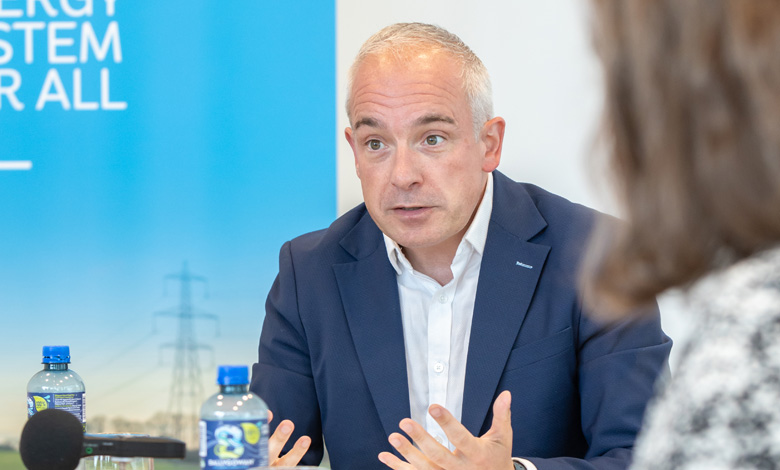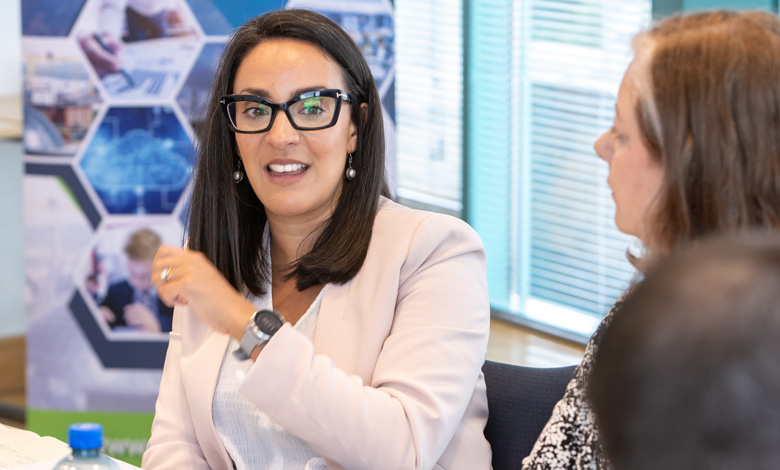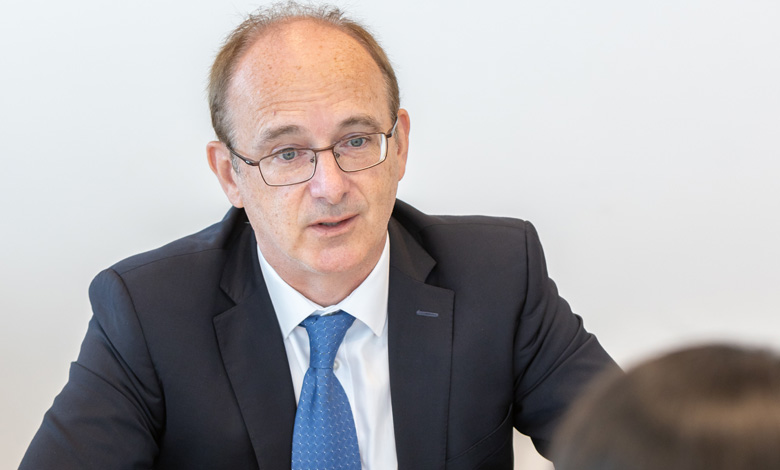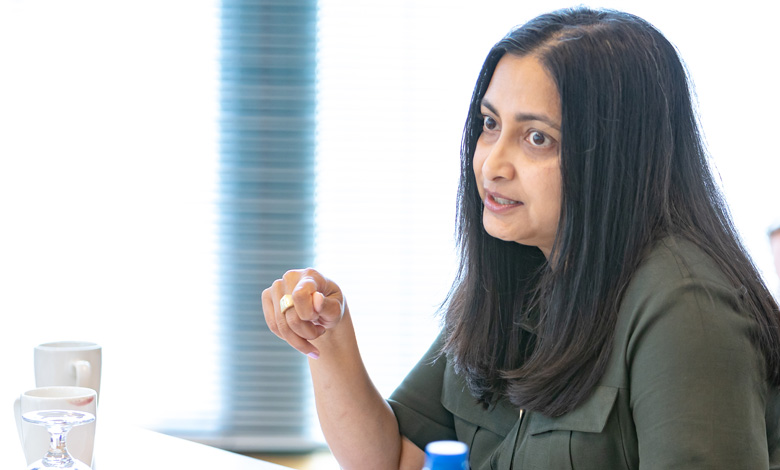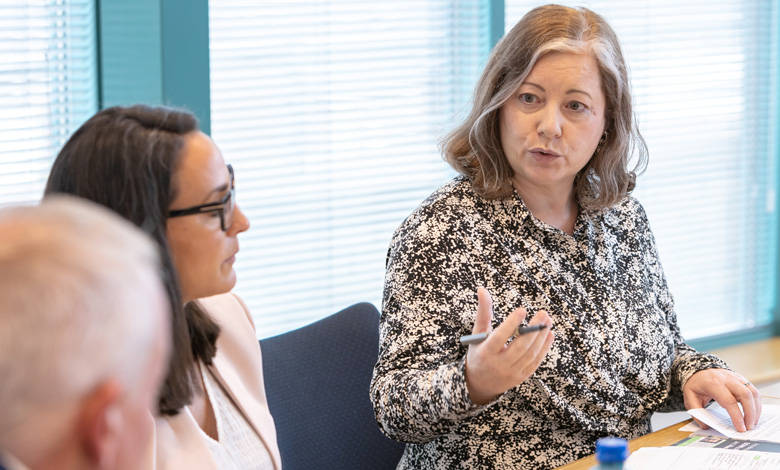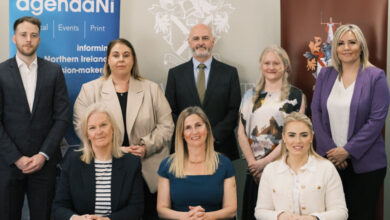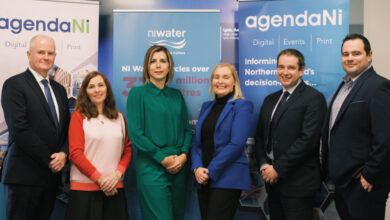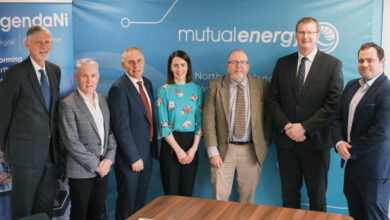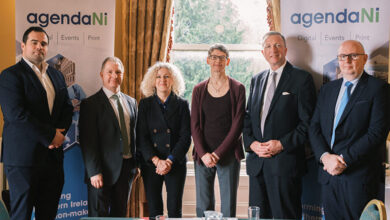A net zero future: Connecting the economic opportunities
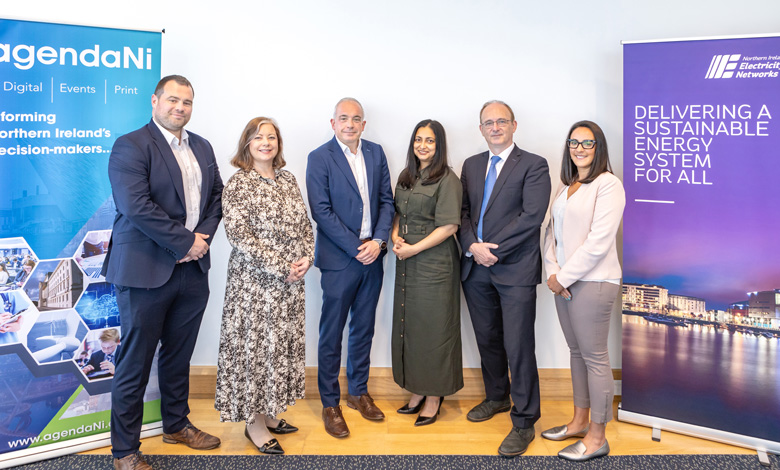
NIE Networks hosted key stakeholders from across Northern Ireland’s economy to discuss how the transition to decarbonised use of the electricity network can underpin the region’s economic growth ambitions.
What role does the electricity network play in improving socioeconomic outcomes for Northern Ireland?
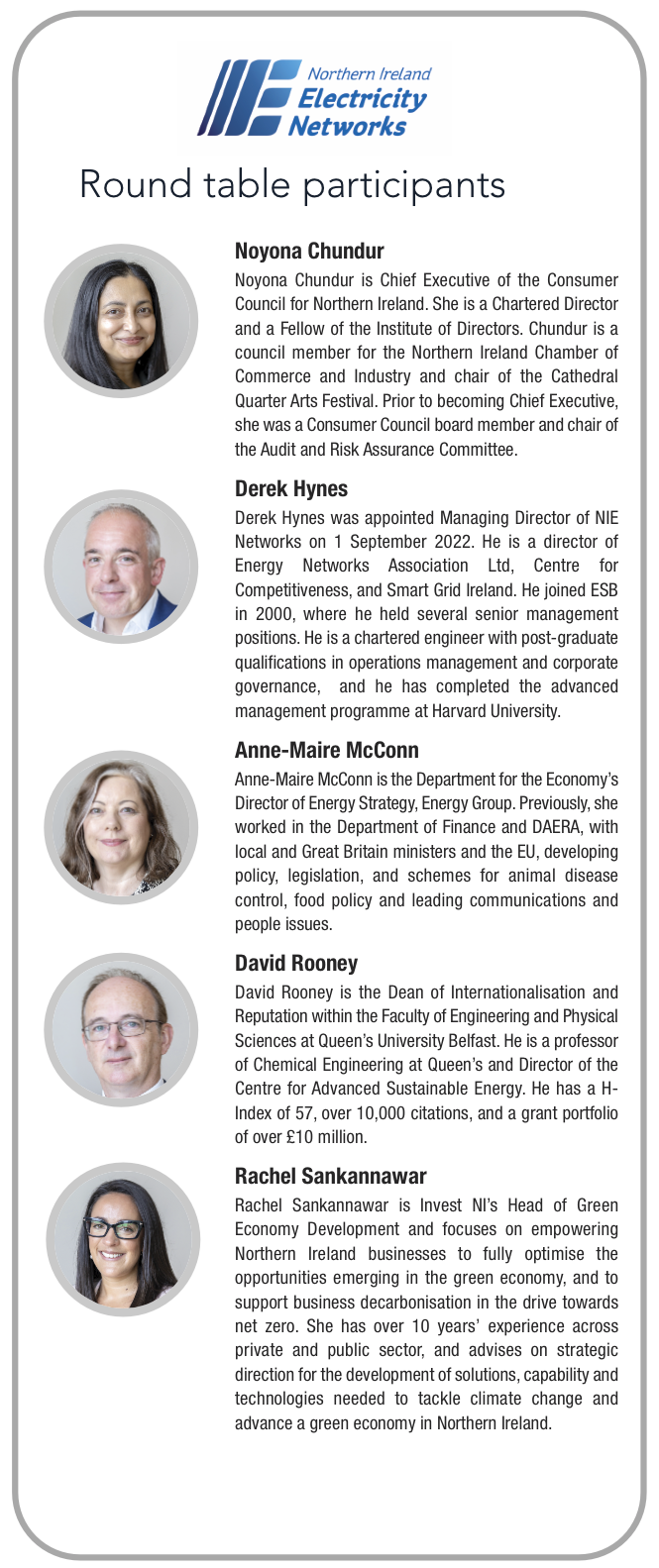
Derek Hynes
The electricity network is a tool for connectivity. A total of 929,000 homes and businesses are connected to the network through wires and cables, making the electricity network a unique offering. We need to upgrade the network if we are going to offer those homes and businesses the opportunity to move away from using fossil fuels. Ultimately, we will invest in the network, but the decisions informing that investment will determine the socioeconomic opportunities that flow from it. Job creation, apprenticeships for our young people, and a better environment are just some of the opportunities that exist for a more modern and prosperous region, if we can maximise those connected opportunities.
Rachel Sankannawar
The electricity network is a critical infrastructure that underpins economic growth, social development, and environmental sustainability. It is akin to a nervous system in that it joins up the regions and presents opportunities for balanced economic development. From a green economy perspective, a reliable and expansive network is not only critical to reaching net zero for the region, but a key agent in attracting new green investments in technologies and fostering the innovation we need to improve social and economic outcomes.
David Rooney
The electricity network is a tool, which may be employed, with great success, to improve socioeconomic outcomes. When we talk about the business connectivity potential, we must give equal consideration to the value of community wealth-building projects that may stem from the upgrade investments. Equally, the electricity network is an innovation platform. Previously, we led the way in renewable penetration, utilising our unique offering – such as our extensive wire network – across a very wide geographical area. There are opportunities that we can maximise for our own economy, while accumulating knowledge that can be exported to the rest of the world, to enable other transitions to net zero.
Noyona Chundur
There is no doubt the electricity network will be a key lever in decarbonising our energy system, but behavioural considerations are hugely important as we progress the transition. Consumers still need the same fundamentals – a secure and reliable supply, at an affordable cost, with minimal environmental impact – however, they are being asked to participate in the transition at pace and at a time when they face significant affordability challenges. There is no realistic pathway for electrification – or any realistic pathway to net zero – that does not require our communities and society to change behaviours at scale, therefore, we must mobilise the opportunities of this change. Getting our communities and citizens participating in and supporting the transition is critical and a key driver is the investment that stimulates and advances economic growth, which consumers will benefit from.
Anne-Maire McConn
Economy Minister Conor Murphy MLA’s recently announced vision is clear on the opportunities to build a green economy through collaborative strategic investment in areas such as the Single Electricity Market and an integrated, balanced, decarbonised energy system. The Department for the Economy is assessing the policy levers that will be required to deploy smart systems and flexibility. A good example is our plan to finalise the high-level design for smart meters later in 2024. In addition, we are working with the Utility Regulator and other stakeholders to research how interconnectors and storage options will impact on all of this. We are also reviewing the electricity grid connection charging policy, recognising that it currently acts as a barrier for consumers and businesses, and ensuring Northern Ireland is a favourable destination for renewable investment.
“Perfection has become the enemy of progress when there are lots of low-regret actions that can be taken now.” Derek Hynes
How can the transition to net zero underpin the Economy Minister’s four strategic policy ambitions?
Anne-Maire McConn
Decarbonisation is one of the four policy ambitions, but it is also a recognised driver of the other three, namely, creating good jobs, increased productivity, and improving regional balance. The DfE’s Energy Strategy predated the Climate Change Act, but it placed the consumer at the heart of the transition and in doing so, recognised the potential for innovative businesses in Northern Ireland, with unique access to EU and UK markets, to not only help protect the environment but to create good jobs, boost productivity, and improve regional balance. By way of example, to maximise the employment opportunity presented by the net zero transition, we are working with industry to publish a skills action plan in September 2024. Similarly, and in relation to regional balance, DfE is coordinating the development of a sub-regional economic action plan in collaboration with local councils and recently launched the low-carbon/net zero sectoral action plan as part of a suite of sector-specific actions.
Rachel Sankannawar
Invest NI recognises the green economy and decarbonisation as a key driver of growth and prosperity. Our role is twofold. Firstly, we help businesses to decarbonise with the view to making them more competitive and productive. Secondly, we look for business opportunities that arise from the global drive to net zero. Oxford Economics estimates that new green activities are projected to create $10.3 trillion in global GDP by 2050. For the UK, this market is projected to deliver up to £170 billion in exports alone by 2030. Northern Ireland needs a slice of this pie and to do so, we must anchor green industrial development within the region to deliver long-term economic benefit.
“Now is the time to mobilise and anchor value offered by the green economy.” Rachel Sankannawar
There are multiple growth pathways that align with the Minister’s four economic priorities ranging from our potential to create and export green technologies and expertise, to ‘crafting clean’ and recognising that a decarbonisation plan is becoming a passport for doing business. As we seek to revolutionise production with renewables and clean energy, organisations like NIE Networks play a critical role in enabling businesses to become more productive and competitive in those global markets.
Derek Hynes
On the surface, NIE Network’s role in reaching net zero is fairly straightforward in that we have to manage the network in a way that enables households and businesses access to clean electricity. That means expanding and improving the network to meet future demand. We are enabled by a mechanism that allows us to fund this through a small proportion of a consumers bill but also importantly, to be able to raise debt. The real challenge lies in the decision-making around how and where we spend that money to ensure we get the best outcomes for Northern Ireland. For example, if we are choosing a location for significant investment, do we opt for somewhere that has historically suffered from a lack of investment, or do we opt for an area that will generate greater capacity for industry to develop? You can see how our connected ecosystem links in with those ministerial missions and the role all our organisations have, not just in decarbonisation, but maximising the economic and societal opportunities of the transition.
“By boosting productivity and delivering better paid jobs, the improved discretionary spending power should enable consumers to make greener choices and investment decisions.” David Rooney
David Rooney
The transition can underpin the economic priorities in two ways. Firstly, by supporting the region’s existing business base and drawing up a roadmap for the direction of travel as we move towards what is effectively a rebalancing with nature. That must include more decentralised production of energy, among other things, and requires greater circularity, being able to use more place-based resources, and activities which are embedded in communities. Secondly, new opportunities will stem from the transition as we maximise the utility of this tool. Every sector in Northern Ireland must decarbonise. On that journey, we have the opportunity to utilise the skills and expertise of our flagship growth sectors to create new business and to boost economic opportunities across the region.
Noyona Chundur
How the consumer interacts with markets and the opportunities being created is important for ensuring they buy into and experience the benefits of decarbonisation, a policy ambition. Also, as a micro-business economy, many businesses interact with the energy market in the same way as individual consumers, meaning they share common traits of low awareness and understanding and uncertainty around decision-making, even if they have the best intentions. To support consumers – and some businesses – we need to offer simple, connected pathways through a one-stop shop where trusted and accessible advice, incentive, support and signposting sits together to lift and guide ambition and action, and crucially, offers them a voice in codesigning interventions.
What are the most significant challenges in delivering net zero and enabling the wider economic vision?
Noyona Chundur
From a consumer perspective, there are two main challenges. The first is ensuring consumer centricity. We talk about putting the consumer at the heart of the transition, but we need to embed it into our business as usual if we are going to achieve the behavioural change required. The second challenge is how we embed consumer insights into the decision-making process, moving away from primarily gathering consumer views when we need to inform policy development. Good consumer engagement is good practice and that means not just gathering the data but ensuring an ongoing conversation, and monitoring lived experiences and how these change over time. Inclusive design principles from the outset will also breed the confidence and assurance people need to participate in the transition.
“Good consumer engagement is good practice and that means not just gathering the data but ensuring an ongoing conversation, and monitoring lived experiences and how these change over time.” Noyona Chundur
Rachel Sankannawar
Our biggest challenges are also our biggest opportunities. If we can prioritise and solve them, then they give us a competitive advantage. On a high level, we have planning challenges, alongside challenges around skills development and workforce availability. We need to be an attractive proposition to secure private investment, and that requires consensus and clear pathways. However, we have proven in the past our ability to be world-leading in renewables when we focus our efforts. Now is the time to mobilise and anchor value offered by the green economy.
David Rooney
Uncertainty around what the net zero agenda means and what impact it will have on consumers and businesses is the greatest challenge. We have had transitions in the past – such as the move to smokeless coal or unleaded fuel – that were successful because the benefits were evident. To date, for the transition to net zero, that has not been the case because we have yet to fully articulate the changes and benefits.
Anne-Maire McConn
De-fossilisation remains the biggest overarching challenge because it requires the restructuring of entire industries. What we are doing in DfE is trying to create the policies, regulations, and legislation that will facilitate that restructure. Decarbonisation is not the job of government alone, but we are cognisant of the need for policy certainty and direction. Our Energy Strategy gives that direction and as we approach the fifth year, plans are in place to carry out a mid-term review of the strategy alongside our stakeholders in 2025.
Derek Hynes
Often the pursuit of perfection is the greatest challenge. To some extent, perfection has become the enemy of progress when there are lots of low-regret actions that can be taken now. There is no point in us reaching net zero by 2050 if we continue to heavily emit carbon up until 2049 because the accumulated damage will be done. Ironically, one of Northern Ireland’s current advantages is that it has lagged behind the energy transition decisions taken in neighbouring countries in recent decades, so there are working technologies that we can copy in a low-regret manner. Smart meters are a good example of where the strive for perfection and certainty is somewhat unnecessary.
Anne-Maire McConn
On the flip side of that, there are consumer acceptance issues stemming from when things have been done wrongly in the past. We must ensure that we are fully communicating how we are doing things better and correctly to ensure we can mitigate those fears and biases.
What are the impacts on the consumer in creating an environment conducive to economic growth?
Noyona Chundur
Net zero is a recognised opportunity to drive economic growth, increase job creation, and deliver the public health benefits from increasing our carbon savings. However, to achieve this the consumer needs to understand what is being asked of them and be able to access the appropriate support, tailored to their circumstances. Remember, it is the consumer who pays for the energy transition, both directly and indirectly, so they deserve to be engaged in the process as early and as often as possible. What we must guard against is the creation of a two-tiered system whereby those who can afford it enjoy the benefits of a decarbonised economy, and those who cannot are left behind.
Derek Hynes
Articulating the benefits of our investment work in the present – delivering a better service in the future – can be difficult. Covid-19 provided a lot of learnings around the importance of grid resilience and the impact any outages had on people’s lives and livelihoods. However, it has not changed a general reluctance to increased bills or additional maintenance work in an area, even if that means greater resilience in the future. It is difficult to have a national conversation about net zero electricity in a rational way because the topic is so abstract that we do not adequately link household choices to the net zero agenda. To this end, we need better communication. As such, we must listen and be prepared to do something different.
Anne-Maire McConn
Demonstrating societal benefits is key to gaining public support for change. On 18 June 2024, the Minister for the Economy announced plans to establish a working group to identify what community benefits can be delivered through industrial decarbonisation. That will act as a pathfinder for us to demonstrate how these projects will bring long-term benefit to communities and change the public perception around near-term actions for long-term gain, in relation to renewables.
“Decarbonisation is not the job of government alone, but we are cognisant of the need for policy certainty and direction.” Anne-Maire McConn
Noyona Chundur
Achieving public buy-in requires coordination to avoid confusion. We need greater cohesion and an agreed common toolkit and priorities. We also need to ensure we are highlighting localised benefits because the macro benefits are confusing for people, and they struggle to apply them to their day-to-day lives. Organisations need to go out regularly and frequently, and communicate with trust, confidence, and transparency.
David Rooney
We are trying to deliver the equivalent of the industrial revolution, in a fraction of the timescale, with a recognition that the immediate benefits are not always obvious to the consumer. It is important that we talk about affordability rather than cost, because they are very different metrics. If we enhance wider economic prosperity, then these measures become more affordable for society. If decarbonisation allows us to grow the economy and increase prosperity by boosting productivity and delivering better paid jobs, the improved discretionary spending power should enable consumers to make greener choices and investment decisions.
How can Northern Ireland maximise its socioeconomic opportunities for the future?
Noyona Chundur
Through a just transition. The two main pillars of this are security of supply – which means safeguarding what consumers need and want – and affordability – which means making the right decisions for consumers as they move through this journey. A just and fair transition embracing all citizens will bring the social and economic benefits that we are seeking to achieve.
David Rooney
We need to embrace risk and the best means to do so is by creating a regional investment fund to support investment decisions, enable action and return investment back into Northern Ireland and into the grid. The electricity network, and other key green energy infrastructures, are being constrained because we are slow to accept risk. Meanwhile, other regions are taking risks and reaping the rewards.
Derek Hynes
I agree with David about risk. We tend to treat the electricity grid like the ‘good sitting room’ at home, where no one is allowed in and there is to be no mess, in the name of security of supply. However, the electricity network is quite a robust system and the feedback we are getting is that while Northern Ireland leads on its grid and renewable penetration levels, it has some of the highest constraints in the world. That risk aversion stems from policy and the idea that there is no room for mistakes. The reality is that we need to take short-term actions while planning for the long-term. The strive for perfection causes a continual churn for perfection of policy and certainty, which distracts people away from doing the things that are achievable now.
Rachel Sankannawar
We need to take the assets and capabilities we have in Northern Ireland and go after the market opportunities. We are uniquely positioned for those opportunities in the green economy, and we need to take some risk to ensure that we are benefiting from those green transactions taking place across the globe. Derek talks about letting people be innovative with our electricity network and the same principle applies to our businesses. We need to be agile enough to tailor and support our vibrant and growing ecosystem of indigenous businesses to the needs of the local and global markets.
Anne-Maire McConn
As a small and flexible region, with limited resources, the opportunities lie in collaboration. If we are to maximise the resources available, we must avoid overlapping on key areas and that is why we are working with partners such as Invest NI to deliver initiatives including the Energy Efficiency Capital Grant. This collaboration must also stretch into our communication strategy around the benefits of the transition to net zero.

